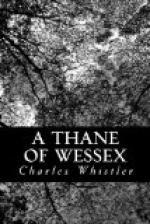But as for me, my thoughts were more than I may write, but it seems to me that they were as those of Saint George when he rode out to slay the dragon in the old days, so great were they.
After that a little wait, and then the horses; and the bishop mounted a great bay charger, managing him as a master. And to me was brought my white horse by the collier, looking a grim fighting man enough in his arms, and to Wulfhere and Wislac black and gray steeds given by Ealhstan himself.
Now the bishop rode, followed by us, to the centre of the levy, and again a great shout rose up even mightier than that first, and when it ended he spoke to the men as he was wont to speak but even yet more freely, and then put himself at their head, and so began the march to Brent. And all the town was out to see us go, never doubting of our victory, nor thinking of how few might return of all that long line of sturdy and valiant fighting men.
When we were clear of the town at last, and went, the men singing as they marched, down the ancient green lanes that had seen our forefathers’ levies and the Roman legions alike, I had time to look around me at my own following, being conscious in some way that, mixed up as it were with the war song, there had been the sound of the droning of a chant as by monks close by me. And I could see no monks near. The thanes were riding round and after the bishop, who came next me as I led the way with the standard, and Ealhstan indeed had on his robes; but there was a stiffness about him, and a glint of steel also, when a breeze shifted the loose fold of his garments, that seemed to say that his was not all peaceful gear.
Just behind me, as I rode with Wulfhere and Wislac to right and left, came my six men, big powerful housecarles, all in black armour and carrying red and black shields, and with a red cross on their helms’ fronts. And the squarest of these six, he who seemed to be their leader, looked up at me, when I turned again, with a grin that I seemed to know. So I took closer notice of him, and lo! it was Guthlac, the reader of Beowulf, and the other five were his brethren. Small wonder that I had not recognized the holy men in their war gear, so little looked they like the peaceful brethren who had walked in the abbey cloisters.
With them was my collier, keeping step and holding himself with the best of them, and I thought that they would be seven hardy Danes who should overmatch my standard guard. So I was well content with the bishop’s choice for me.
Now of that march to Brent, and the meeting there with the Somerset levy, there is no need to tell. But by the time we marched from thence against the Danes, there were five hundred men of Dorset, and near nine hundred of Somerset. Of the Danes some judged that there would be eight hundred or more, but if that was so, they were tried men, and our numbers were none too great. Moreover, we must separate, so as to drive them down to their ships, for they were spread over the country, burning and destroying on every side.




